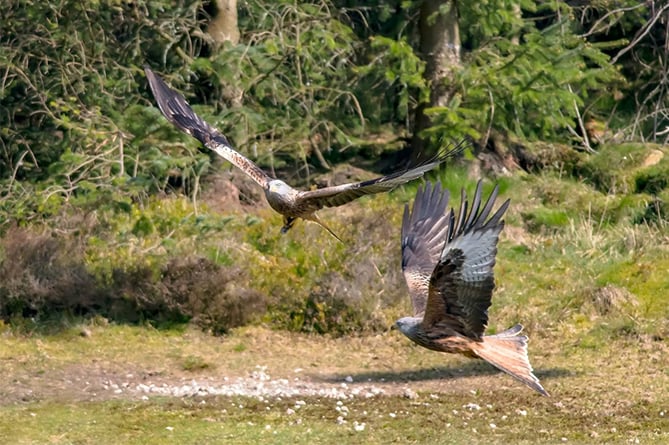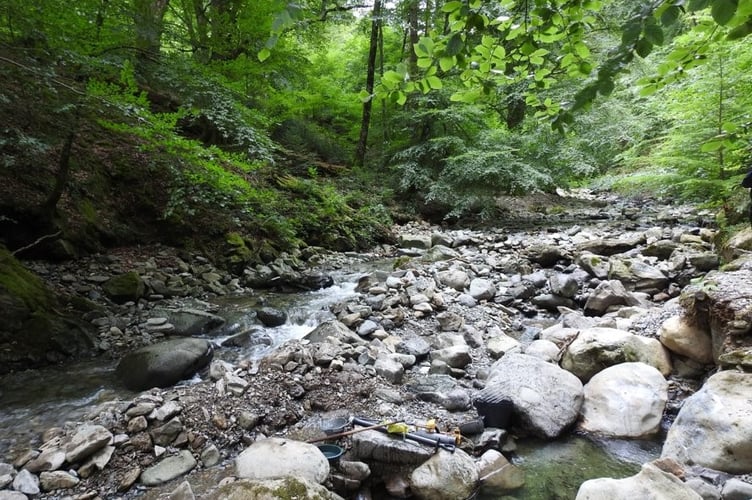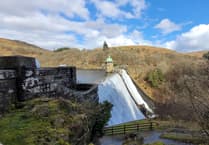Natural Resources Wales’ Mid and North Wales visitor centres draw hundreds of thousands of people every year, praised by locals for adding to the value of local communities, enthralling visitors for highlighting the natural beauty and wildlife that share our landscapes. The Ynyslas Visitor Centre alone, set in a unique miniature biosphere just north of Borth in Ceredigion, receives some 400,000 visitors every year. About 20 minutes’ drive away, set in the rolling Cambrian mountains, Bwlch Nant yr Arian is renowned for its Red Kite bird feeding, while near Dolgellau, the Coed y Brenin centre is the focal point for world-class mountain biking since it opened in 1996.
Back then, it was a time of plenty, with NRW given funding from the European Union to build and maintain the three visitor centres. But that was then.
Now? The future of the centres is up in the air, threatened by a sever financial crisis that could all three close by the end of the year.
Instead of talking about ‘excellence’, the dialogue has shifted to whether the centres can simply survive or how much time have they left.
In December 2023, the NRW announced it was considering closing the three visitor centres in Wales in an effort to cut costs.
Coed Y Brenin, Gwynedd, Bwlch Nant yr Arian and Ynyslas, initially, could have been closed as early as this week, the end of the 2023/24 financial year.
But the announcement led locals of each area to rally behind their centres, creating petitions, raising awareness, and pushing to have public meetings organised with NRW bosses about their future.
Shortly after the announcement, a petition was made to save Ynyslas Visitor Centre. Within days it almost reached 3,000 signature. Now it around the 5,000 mark and growing daily. Another petition to the Welsh Senedd on the centre’s future has garnered some 2,000 signatures already and continues to add names consistently.
But appeals to the Senedd are also being made from inside its Cardiff Bay chambers. Dwyfor Meirionnydd MS Mabon Ap Gwynfor raised the issue with First Minister Mark Drakeford about what steps were being taken by the government to ‘safeguard’ the sites, pointing out the ‘significant’ economic contributions and health benefits that come from the centres.
He said: "These centres attract thousands of visitors annually, both local and from afar - contributing significantly to our local economies and are a key player in supporting preventative health measures.'
"I’m sure the First Minister will agree with me that closing any one of these centres would be damaging. What steps is the government taking to secure the future of these important centres?"
Mr Ap Gwynfor has the support too of Dwyfor Meirionnydd MP Liz Saville Roberts and both met with NRW bosses along with others who have taken up the cause of saving the three visitors’ centres. Public support is both loud and widespread, with Mr Ap Gwynfor aligning with Dafydd Caradog Davies MBE, founder of Coed y Brenin bike tracks, in a public meeting attended by more than 200 people to discuss protecting Coed y Brenin and securing its future.
In Borth, it’s a similar story, with locals pressuring representatives of the NRW. Over 100 locals would gather in the village’s Community Hall earlier this month, alongside Ceredigion MP Ben Lake, and MS Elin Jones, to show support for Ynyslas and demand its future be safeguarded and ringfenced from NRW cuts.
Though it was confirmed at the meeting that the Ynyslas Visitor Centre l remain open through the 2024 season, its future is still far from certain.
Sarah Jennings, who represented the NRW at the meeting, said: “The visitor centre in Ynyslas will not be closing on March 31. We are out for recruitment now in all of our visitor centres for the season. We are looking to keep things running as long as we can, but it is difficult, and we want to work with people to find a long-term solution.
“There is no secret plan, and no decisions have been made yet. But the reality is these visitor centres were built in a time of plenty, when we had funding we don’t have now.”
Ynyslas’ visitor centre had a further role than the visitor centres in Coed y Brenin and Bwlch Nant yr Arian, as part of the centre’s function is to protect the Ynyslas nature reserve.
The centre’s staff have been praised by locals for their work to protect the nature reserve, and the centre has won awards in recent years for its ‘excellent’ standards. In 2022, the centre won the Green Flag award for having the highest possible environmental standards and excellent facilities.
Commenting on the award, NRW Head of Operations for Mid Wales, Gavin Bown, said: “Green Flags are only awarded to visitor destinations that meet the highest of standards, and we are delighted to have met them.
“Popular with locals and visitors, Ynyslas is a special place where we continue to try to strike the right balance of protecting a national nature reserve with enabling access to an internationally important site.
“This award was made possible only through the hard work and dedication of our staff. They make sure that visitors have a great time and want to come back.”
The centre’s staff also work closely with the police to stop vandalism, trespassing, and damage to the nature reserve from cars, as well as beachgoers having barbecues or making a fire in the area.
But without EU funding, and with a need to cut costs, NRW conceded it has to seriously look at the future funding for Coed y Brenin, Bwlch Nant yr Arian and Ynyslas.
As things stand now, Coed y Brenin and Bwlch Nant yr Arian are running at a loss of about £500,000 each annually. For Ynyslas, the picture isn’t as bleak, but it still runs at a £50,000 deficit.
Before those at the NRW considered closing the centres, they experimented with giving them a more commercial focus – but it might be a case of too little too late.
During the public meeting on March 1, one concerned resident said: “Ynyslas isn’t taking a loss like the other visitor centres, but it will be paying the price.”
Others pointed out that if the price of parking at Ynyslas were put up by £1 or £2, the centre would make more than the £50,000 it needs to break even from parking charges alone.
Chris Heron, who has written a letter to the NRW, asked where the money earned from car parking already is being spent.
Chris said: “I attended the community meeting at Borth Community Hall on March 1, we were told at first that Ynyslas was not making a loss, but that the other two visitor centres also at risk of closure are. Why is Ynyslas visitor centre being singled out for closure when it’s not making a loss?
“Ynyslas is visited by 400,000 visitors a year and the car park alone is £3 a car per visit, those 400,000 visitors all spend their money in the visitor centre shop too. Where is the money which this generates being spent?
“Why can’t the savings needed overall be made from cuts higher up? Why do these cuts always have to be made at literally the grass roots level?”
Aberystwyth resident, and ‘lover’ of Ynyslas, Polly Earnest, sees the visitor centre as an important place to educate people on the conservation of Ynyslas and teach people why the rules that are in place there are important.
She said: “I’m the kind of person who would do the sorts of things that would destroy the dunes without noticing. I’m originally from Hereford and Borth is the nearest seaside to us. I used to bring my children here about 20 years ago, and we’d go swimming in the sea, running through the dunes and we didn’t even think about the nature, the unexploded ordnance, or the strong tides. I only know now because of the visitor centre. I needed that information and guidance.
“Ynyslas is important for conservation. The NRW have said they don’t have a remit for education, but as I see it, you can’t have conservation without education, because you’ll get people like me who don’t know any better. I’ve learned so much using the interactive displays in the centre, they’ve taught me about coastal erosion and how the dunes interplay with it.”
“It’s not just education about the landscape either, there’s unexploded ordnance there and a very diverse tide. I wouldn’t know that the area on the estuary where you park your car can flood. Without the staff there, you can easily see how someone could park there, only to come back and find their car underwater.”
For her, the visitor centres are particularly important because they’re a safe place in a rural and isolated area. Polly regularly visits Ynyslas and says the reason she feels so comfortable being there alone is because she knows there are staff at the centre who can help.
She said: “It’s an isolated spot. As a woman going there with small children, it’s a good feeling to know that there are people there and that the visitor centre is staffed and I have somewhere to turn to if I needed help. I’m wary about going to isolated places, but I never feel that about Ynyslas.”
“It’s a great place for people with mobility issues too. There aren’t many places where you can go and see the sea if you do have mobility issues. You can drive straight onto the estuary, and you’ve got the boardwalks.
“If the centre closes, people will park there. If they don’t allow parking on the estuary, people will park all around the area. If someone needs help, who will be around? There was a woman who fell off a horse there a while ago, what would have happened if the staff at the centre weren’t nearby to help? The centre needs to be there.”
Polly is a member of a group of 26 locals who have been trying to raise awareness of the threat to the centre, putting banners up in the local area, and writing to the NRW, naturalists and others to bring it to everyone’s attention.
But support for the centre has come from outside of the town. TV actor and nature observer Iolo Williams paid a visit to the centre and appealed to the NRW and Welsh government to keep it open.
He said: “The Ynyslas Visitor Centre is under threat from Natural Resources Wales and the Welsh government who are threatening to close it down. I’m appealing, please don’t because it’s such a valuable commodity. The visitor centre is used by locals, by visitors, and it’s used by students. Please rethink, it’s so important that we keep these places open, they’re a valuable education tool.”
Maxime Voidy, a French researcher who has been examining the impact of tourism on coastal towns in Ceredigion and researching sustainable tourism, said closing the centre would be a ‘step back’ for sustainable tourism in Ceredigion.
He said: “In my project I really wanted to tackle the question of sustainable tourism. Sustainable tourism is tourism that is aware of the economic, social and environmental impact on the areas concerned and the host populations.
“Ynyslas is a very good example of this. It's a nature reserve visited by many tourists, and it needs to be managed to minimise the impact of the hundreds of thousands of people who come each year. Closing this centre would be a real step backwards on the road to sustainable tourism.”
Though the future may look uncertain for the visitor centres, with NRW confirming their review is still ongoing - it doesn’t mean they will have to close if they aren’t supported by the NRW.
In both public meetings discussing Ynyslas and Coed y Brenin, NRW representatives said they were accepting expressions of interest from people in the community who would be interested in running the centres as community enterprises.







Comments
This article has no comments yet. Be the first to leave a comment.